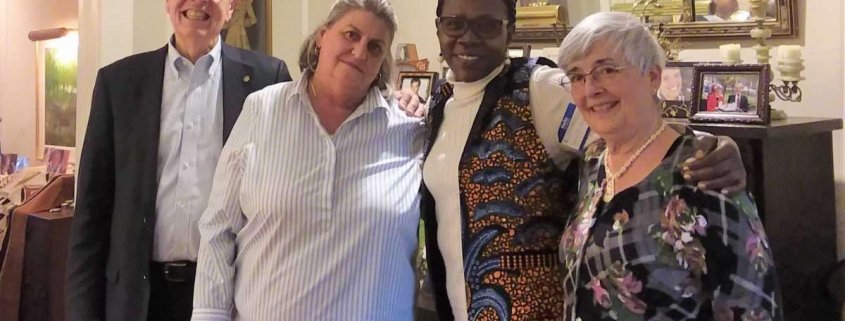‘Love’ drives Greater New Haven’s decade of devotion to a school in Africa
When Evalyn Wakhusama describes the children who are candidates to attend the Nambale Magnet School she founded in Kenya, she uses words such as “pain,” “devastation” and “traumatized.”
Yet, that changes as Wakhusama speaks of what happens to those orphaned and vulnerable children when they are enrolled in the school in a rural part of Western Kenya.
Wakhusama’s words then change to “hope,” “food,” “education” and “love.”
“It is life changing,” Wakhusama said, her hands lifting as she spoke of the benefits of the school, one hand touching her chest as if to emphasize she is speaking directly from her heart. “It is putting them on a path to self-esteem, the future is brighter.”
Putting hundreds of children on that brighter path is deeply connected to Greater New Haven, 7,000 miles away from Nambale — and now to an even a broader swathe of Connecticut.
The connection began nearly 20 years ago when Wakhusama was attending Yale Divinity School in 2000. While earning her degree there, Wakhusama worked part-time as an associate pastor at Christ Episcopal Church in Bethany, and became an integral part of the local community of faith. The relationships endured and grew, according to Loretta Smith, a church member and volunteer president and director of WIKS-USA, Inc., a nonprofit organization and financial supporter of the Nambale school.
By around 2004, Wakhusama shared her dream to open the school for children left orphaned or in need by the HIV/AIDS crisis in Africa, as well as the abject poverty that is present in parts of the region of Kenya that borders on Uganda.
Through Wakhusama’s relationships with and financial backing from WIKS-USA, and other supporters, the school opened in 2009 with 35 students, she said.
Since then, Nambale Magnet School has grown to serve 435 students, about 250 of whom board at the school, and employs more than 60 people, Wakhusama said. The school is selective in choosing students who need them most, working with a local social worker.
“They have never been children as they should be,” Wakhusama said, of beginning students.
“This (school) begins to change their way of live completely,” she said.
The school also enrolls some paying students who are fully integrated in everything, Wakhusama said.
Wakhusama visited Connecticut this week, gathering with supporters, including Loretta Smith and her husband, J. Philip Smith, to celebrate the lives that have been changed since the school opened 10 years ago, as well as its success in growing.
Among elements added to the school over the years were a new academic wing, a girls’ dormitory, teacher living quarters and a guest house, Wakhusama said. But the school also added a farm, a sewing center they hope can be used for vocational training, greenhouses and a beekeeping operation, she said.
The sewing center, for example, creates wares that can be sold to benefit the school, as well as making uniforms for the school, Wakhusama. The farm and growing operations also produce salable items.
“We would like to become self-sustaining,” Wakhusama said.
Toward the goal of sustainability, the school this week learned it would receive a Rotary grant that will allow it to drill a well, add a solar pump, build a water tower to store it, as well as a methane collector to provide fuel and a biodigester to treat organic waste, and other elements.
Orange Rotarian Lynda A. Hammond, who also is the Rotary International Committee. and grants chairwoman, helped to write the grant that will pay for the work. It was provided by the Orange Rotary Club, the District 7980 Rotary Clubs, (encompassed by the southern Connecticut region of clubs) and Rotary International, Hammond said.
The Orange Rotary was familiar with Nambale because it provided the money in 2005 for the architectural drawings for the school, Hammond said. A Rotary Club in Kenya embraced helping with the project, Hammond said.
The Rotary, a service organization, recognizes the economic component the grant will provide, the employment opportunities and chances for the school to expand its sustainability, Hammond said. But despite the hard work that goes into arranging such grants, there is powerful a draw to help the children, she said.
“When you hold one of these children, you know why you are doing it,” Hammond said.
For more information about WIKS: http://www.wiks-usa.org/.





Leave a Reply
Want to join the discussion?Feel free to contribute!